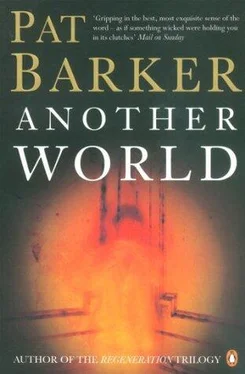‘Gareth, what do you want? ’
Gareth’s thinking how ugly she looks, with her great big bulge sticking out. He wonders what the baby looks like. Is it a proper baby with eyes and things or is it just a blob? He’d watched a brill video at Digger’s house, when his mam and Teddy were still in bed. A woman gave birth to a maggot because her boyfriend had turned into a fly or something like that, he never really got the hang of it because Digger kept fast-forwarding to the good bits. And the maggot was all squashy when it came out, and they kept looking at each other to see who’d be the first to barf but nobody did.
‘What are you staring at?’ Fran asks sharply.
‘Nothing.’
‘Have you done your homework?’
‘Yeah.’
‘What was it?’
‘When’s she coming?’
‘ “She’s” the cat’s grandmother.’
‘When’s Miranda coming?’
A glance at the clock. ‘They should be here now. What did you have to do?’
‘The Great Fire of London.’
‘I thought you’d done that.’
‘Not with Miss Bailes. Why is she?’
‘Why is she coming?’ Fran hears herself repeat in a Joyce Grenfell comic-nanny sort of voice — she can’t believe it’s coming out of her mouth; this is what having kids does to you — ‘Because it’s her home.’
A derisory click of the tongue. Gareth edges closer, scuffing his sleeve along the table. In a moment he’s going to touch her and, God forgive her, she doesn’t want him to.
‘What’s wrong with Barbara?’
Fran opens her mouth to insist on some more respectful way of referring to Barbara, then closes it again. How is a child supposed to refer to its stepfather’s first wife? ‘Auntie’ Barbara sounds silly. And ‘Mrs Halford’, though technically correct, doesn’t sound right either. ‘She’s ill.’
‘What sort of ill?’
Fran shrugs. ‘Ill enough to be in hospital.’
‘How long’s she coming for?’
‘Six weeks.’
‘Shit.’
Yes, Fran thinks. Shit. ‘I hope you’re going to make more of an effort this time, Gareth. You don’t have to play together —’
‘We don’t “play”.’
True, Fran thinks. Gareth’s obsession with zapping billions of aliens to oblivion hardly seems to count as play. ‘You’ll have to be here to meet her when she comes, but —’
‘Why?’
‘Because I say so.’
He reaches her at last, rests his hand on her shoulder for a second while she sits motionless, enduring the contact. After a while the small warm thing is lifted off her and he goes away.
‘Sorry I’m late,’ Nick says, heaving Miranda’s suitcase into the boot. ‘Traffic’s terrible.’
‘ ’S all right.’
He knows she’s hoping for something to happen, a cup of tea, anything, to prolong the time alone with him before she has to face Fran and Gareth. Well, it can’t be like that. ‘Did you have a good journey?’
‘All right.’
She gets in, clicks her seat belt. Sighs.
‘Is term over?’
‘I don’t know. I missed the last few weeks.’
‘Because of Mum?’ Nick, craning to see over his shoulder, delays reversing. ‘How is she?’
‘Fine.’
He looks at her shuttered profile. By no possible standards can a woman confined to a psychiatric hospital for an indefinite period be described as ‘fine’, but then Miranda knows that. ‘Fine’ means: You no longer have the right to know.
‘How’s Grandad?’ she asks.
‘Not good. Operation tomorrow.’
A pause. Typical of Miranda that there’s no automatic expression of sympathy. ‘Will I be able to see him?’
‘Maybe in a few days. He’ll be pretty rough to begin with.’ He glances sideways at her. ‘Is Mum very bad?’
‘No, she’s fine.’
A pursing of the lips brings the conversation to a close. Though very shy, Miranda can be formidable. And perhaps she’s justified in refusing to answer. What right has he to know? He remembers Barbara coming in from the garden one morning, complaining in that bright, jokey, hysterical way that somebody’s been putting green fly on her roses. He and Miranda exchanged glances, in it together. And then, less than a year later, he moved out and Miranda realized that while she was in it for life, he was merely in it for the duration of the marriage.
‘How’s Fran?’ Miranda asks politely.
‘Fine.’ For God’s sake, we can’t have everybody fine. ‘Tired. Jasper’s teething.’ Jasper’s always teething. It’s like hand-rearing a great white shark.
‘Has Gareth broken up?’
‘Not yet, day after tomorrow.’
Miranda receives this information in silence. She and Gareth have not so far managed to hit it off, though they’re at a stage when the sexes separate naturally; the hostility between them doesn’t necessarily spring from personal dislike, or so Nick tells himself.
‘Dad?’
‘Hm?’
‘Can I tell you a joke?’
‘Yes, go on.’ He’s concentrating on the traffic.
‘There’s this fella and he gans to a pro and he says, “How much is a blow job?” and she says, “A tenner.” So he turns out his pockets and he says, “Aw hell, I’ve only got the seven, what can I have for seven?” She says, “You can have a wank,” so he gets his dick out and she looks down at it and she says, “Here, love, have a lend o’ three quid.” ’ A pause. ‘Is that funny?’
‘Yeah, quite. Where’d you get it from?’
‘Man on the train.’
Oh yes. ‘Was he a nice man?’
‘All right. Bit drunk.’
If this is an attempt to divert him from asking questions about Barbara it’s certainly succeeding.
‘What do you call three blobs on a window pane?’
‘Miranda —’
‘Da-ad.’
‘OK — what do you call three blobs on a window pane?’
‘Condomsation.’
‘Did he sit next to you all the way?’
‘I got that one from school.’
He can’t keep up with the changes in her. Even if they were still living together he’d probably be finding it difficult — apart, it’s impossible. ‘Not long now,’ he says.
‘Why’s it called Lob’s Hill?’
‘Dunno. I keep meaning to look it up, but there’s so many other things to do. We’re not unpacked yet.’
They’re driving through Summerfield. Here the streets run in parallel lines down to the river, to the boarded-up armaments factory, like a row of piglets suckling a dead sow. Before the First World War 25,000 local men worked in that factory. Now it employs a few thousand who drive in from estates on the outskirts of the city.
He never gets used to this, no matter how often he drives through it. Floorboards in the middle of the road, broken glass, burnt-out cars, charred houses with huge holes in the walls as if they’ve been hit by artillery shells. Beirut-on-Tyne, the locals call it.
The traffic lights are on red, but he doesn’t stop. Nobody stops here. You slow down, but you don’t stop. It’s difficult not to slow down, there are so many traffic-calming devices: chicanes, bollards, sleeping policemen. Law-abiding motorists creep through at fifteen miles an hour. Joy riders, knocking the guts out of other people’s cars, speed along this road like rally drivers.
Leaving it behind now, thank God. He picks up speed on the hill, the houses on either side increasing in prosperity with every mile that separates them from the estate. Huge Victorian houses built by iron magnates, shipbuilders, armaments manufacturers, well away from the sight and sound and smell of money. Most of them are divided into flats now. Lob’s Hill is one of the few houses left that’s still a family home.
As he turns into the drive, branches from overgrown bushes on either side rattle against the windows. The house is big, ugly, late Victorian, the turrets at either end surmounted by faintly ludicrous towers. Nick turns off the engine. He can feel Miranda not liking it.
Читать дальше












